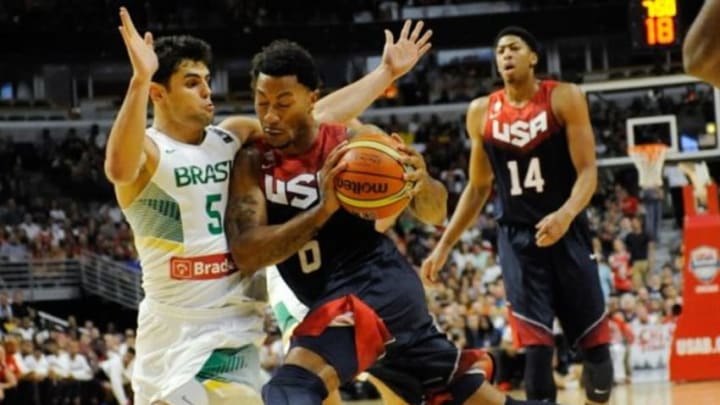FIBA has a new schedule going into effect in 2017 and it’s one that could have USA Basketball having to scrap its Dream Team approach, at least as far as qualifying for the FIBA World Cup goes.
According to a report, a new qualifying schedule will include two of the windows of play coinciding with the NBA season, leading to a scenario in which the U.S. could be filled with players from the NBA Developmental League.
ALSO ON HOOPSHABIT: 30 Greatest Draft Steals In Lottery Era
ESPN.com’s Mark Woods reported that the idea of shutting down the NBA season for qualifying play set for November and February was deemed a non-starter by the league.
Most leagues around the world will simply shut down for the two 10-day periods to accommodate the FIBA tournament schedule. But international leagues play far fewer games than NBA teams to.
More from NBA
- The 5 most dominant NBA players who never won a championship
- Meet Cooper Flagg: The best American prospect since LeBron James
- Are the Miami Heat laying the groundwork for their next super team?
- Sophomore Jump: 5 second-year NBA players bound to breakout
- Constructing the NBA’s perfect all-under-25 starting five
One idea that was proposed early in the process was to allow a national team to be assembled and play during the All-Star break, but that is off the table, according to the report.
According to FIBA, everything has been done in coordination with the NBA and USA Basketball.
“The whole concept was developed in very close cooperation with the NBA and USA Basketball,” said FIBA sports and competitions director Predrag Bogosavljev. “They have difficulties in getting NBA players for qualification but they have certain depth.
“They are discussing different opportunities together. One of them is using the D-League. But there are also some other options. But they will participate and find the best way to do it.”
A gold medal at the Rio de Janeiro Olympics next year does not assure the U.S. a spot in the 2019 FIBA World Cup.
“By making the change in the system, it is a choice between having the best NBA players at our final tournaments or not,” said Bogosavljev.
The two-team option is something much more viable for the U.S. than for countries such as France and Canada with federations that rely more heavily on their NBA contingents.
FIBA believes the plan will help grow the game by providing national teams with additional exposure and, more importantly, additional revenues.
But when it was unveiled Tuesday at EuroBasket in France, the plan got less than an enthusiastic response, as federations realized they could also be put in the position of having to field a roster devoid of their NBA stars.
Coaching could also be affected. It’s hard to foresee a scenario in which Duke coach Mike Krzyzewski steps away from the Blue Devils in February, with the NCAA tournament around the corner. Other nations who rely on coaches from the NBA and NCAA ranks would also be affected.
Dallas Mavericks owner Mark Cuban—long a critic of allowing NBA stars to participate in international competitions—has proposed changing the Olympics to an under-22 competition, thus minimizing the NBA’s exposure.
But that idea is off the table until the 2028 Olympics, at the earliest.
Senior NBA sources told ESPN.com that support is still strong for stars playing international events, the debate heated up last summer when Indiana Pacers All-Star Paul George was hurt during the USA Basketball showcase in Las Vegas as part of the lead-up to last year’s FIBA World Cup.
FIBA’s resistance to changing the Olympics is reflected in the difference between basketball and soccer on the international level.
“The reality is today if you ask Lionel Messi what he would like to win with Argentina, he will tell you the World Cup,” said FIBA executive Patrick Koller. “If you ask LeBron James what he wants to win with the USA, he will tell you the Olympics. That is the reality.

The J-Notes
“The idea is to move the basketball World Cup to the next level. We have had a lot of discussion about what we will do with the Olympics, but we still believe the Olympics is really positive for basketball and it would be wrong to downgrade the Olympics. So we will keep the Olympics as it is.”
Call me unpatriotic, but I’ve never been a huge plan of any of the international events—particularly the Olympics—since the U.S. had the rules changed after not winning a gold medal with a team of collegiate players at the Seoul Olympics in 1988.
While recognizing the impact the original Dream Team had on the sport globally, it still smacks too much of “we lost, so we’re changing the rules” for my taste.
The reality of 1988 in Seoul was that coach John Thompson put together a team that would have rolled to a national title at Georgetown, but one that was ill-suited for international play, with not enough shooters or offensive creativity.
But if beating Nigeria 156-63 makes everybody cheer and chant “USA! USA!” who am I to argue?
Next: NBA: 50 Greatest Players Of All Time
More from Hoops Habit
- The 5 most dominant NBA players who never won a championship
- 7 Players the Miami Heat might replace Herro with by the trade deadline
- Meet Cooper Flagg: The best American prospect since LeBron James
- Are the Miami Heat laying the groundwork for their next super team?
- Sophomore Jump: 5 second-year NBA players bound to breakout
